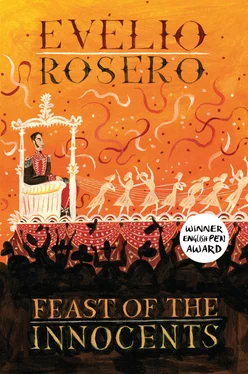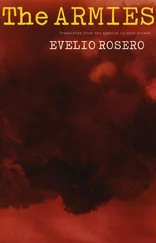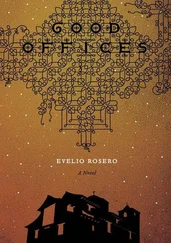“How many men went there with Bolívar?” Doctor Proceso asked.
“Five: Miguel Peña, Juan Paz del Castillo, Carabaño, Mires, Casas. As you can see, you’re not Sañudo’s only reader. Surprised?”
The doctor leaned over one of the panels that was already completed: Simón Bolívar and eight of his officers abandoning the square inside Puerto Cabello — with its three thousand guns and four hundred quintals of gunpowder — to the mercy of an uprising by unarmed Spaniards; they fled flat out, the nine faces showing disproportionate fear; even the galloping horses had expressions of terror, and, if you looked more closely, there was something extraordinary about them: the gaping faces of the nine horses were faces of petrified virgins, about to be sacrificed. The wooden lettering stated: BOLÍVAR FLEES FROM PUERTO CABELLO AS IF THE DEVIL WERE ON HIS HEELS .
“But I want to show you something I made, long before reading Sañ-udo,” Maestro Arbeláez said.
He left his tools on the table and stood for a moment in thought, wiping his hands on his leather apron. He came from Tumaco originally: a burly black man, with bloodshot eyes, and — the doctor thought — the unwavering sullenness of an abandoned child. He marvelled at this apparition of a giant, who carved wood as if breathing life into it, and he allowed himself to be led along a pathway of shrouded statues.
The studio was in a large, damp, rented house, and was so dark that it was surprising a visual artist could create his work in there. The maestro had to labour by electric light: beneath the pale bulbs his shadow seemed to float as if among age-old torches. He stopped in front of one of the sculptures and became thoughtful once more. Before uncovering it, he turned to the doctor.
“I didn’t make this because I’m black,” he said. “But almost.”
And he smiled, without losing his sullen expression.
“I have to admit,” he went on, “that the fact General Manuel Piar was black aroused my curiosity, in the beginning, and later on, more than anything, Bolívar’s reasons for ordering him to be shot: he said Piar wanted to establish pardocracy, and used this to frighten the upper-class patriots, who feared being under the command of a black man, how about that? Bolívar assumed just the right kind of ingenuity for his day and age.”
“They left Piar unprotected,” the doctor said. “Piar, who up to that point had acted impeccably, unlike Bolívar and his flawed imaginings. That was how Bolívar managed to disguise the real reasons for the execution.”
“Bolívar was afraid of Piar’s intelligence, his independence of thought, not just his military qualities,” Maestro Arbeláez picked up the thread, “Piar wasn’t a toady, like the others. Faced with Bolívar’s campaigns, all of them useless up to that point, Piar had nicknamed Bolívar the ‘Napoleon of withdrawals,’ no less. I don’t know if the name reached Bolívar’s ears, but Piar had already warned the others about his idiotic and pretentious Napoleonism, and about his main strategy, which seemed to consist of retreating at the slightest sign of danger.”
Here the maestro’s smile put in another appearance, and now his sullenness ceased to be unwavering; the more he talked, the closer he came to roaring with laughter.
“Remember the Battle of Junín,” he said, “which wasn’t a ‘battle,’ according to the technical terminology of warfare. Sañudo initially says it was a ‘skirmish,’ subsequently he says ‘fight’; in his History of America Estébanez says it was really an ‘engagement’; Cortés Vargas goes further and calls it a ‘gamble.’ Skirmish, engagement or gamble, Bolívar fled the field when he thought his cavalry was defeated; he didn’t stick around long enough to observe that a squadron of lancers took the royalists by surprise; he alone fled to behind the cover of his infantry, galloping at the double, and withdrew to a hill ‘until the evening shadows covered the field’… Colonel Carvajal finally managed to find him to inform him that while the general was retreating, the enemy was put to flight. He said: ‘Fear not, Liberator, victory is yours.’”
The maestro finished off his speech with a great guffaw but the doctor was unable to join in, too astonished by the pearly splendour of the laughter, its immoderate booming. And yet he heard the maestro say, with the last gasps of mirth:
“Gamble or engagement, historians used Junín to build another pillar of glory for Bolívar to stand on, another crowning moment made from what was only a brief skirmish in which two thousand Peruvians deserted the royalist ranks, a fight that wasn’t even suggested by Bolívar but by the Frenchman Canterac, who led the royalist forces; Bolívar wasn’t even there for the clash, he ran away.”
With a tug the maestro pulled the dust sheet from the sculpture — a realistic figure, in reddish bronze — and waited in silence; it was General Manuel Piar’s execution by firing squad: no blindfold, looking at the sky, barefoot, his shirt torn, legs slightly bent, it looked like he had just been hit and was starting to fall without ever reaching the ground.
“We must put the shooting of Piar up on the float,” Doctor Proceso said. “Poor Piar, a great strategist: he waited for death calmly and said it was not being a traitor but a patriot that led him to the firing squad. His end was terribly ironic: they were not shooting him because he interfered with Bolívar’s plans, but because he was black and wanted to establish pardocracy.”
“Piar had been born in Curaçao, of a white Venezuelan father and a mixed-race mother from the island,” the sculptor responded. “He was a combination of races, like Bolívar: Bolívar’s paternal great-great-grandfather had a relationship with a black woman in his household called Josefa, who gave birth to María Josefa: her daughter Petronella married Bolívar’s grandfather, and this doesn’t matter to us, not to you, not to me,” he suddenly shouted, “we don’t give a damn, but go and say that to Bolívar, were he alive: one more execution.”
“Who doesn’t have black blood mixed with indigenous and white in these beleaguered countries?” the doctor asked.
The maestro was exhilarated by this.
“We’re not black, white, indigenous or yellow,” he said, “but we’ve all got black, white, indigenous, yellow and who knows what blood running in our veins. Best we don’t find out.” And again, an explosive laugh that barely let him speak contorted his face. “In fact, Bolívar didn’t care about blacks: the abolition of slavery was just a signature on a document for him, he didn’t do anything concrete for the blacks; the first time he mentioned the need for abolition was because of the request from President Pétion, a black Haitian, who made him formally promise the emancipation of the slaves in return for money and munitions. Pétion effectively supported him when Bolívar fled to Haiti in order not to face up to the responsibility that was his due as leader. Bolívar would only go back once the wind was blowing in the patriots’ favour; he was a wily parasite, taking every opportunity afforded him by the other generals’ victories.”
Another guffaw burst out and rang all around.
“He didn’t just hold a grudge against Piar,” he managed to resume, close to choking, “but against Mariño and Páez too. He could not run any risks with his presidency for life, his monarchy of the Andes. And what about Admiral Padilla’s execution by firing squad?” he asked, laughter bubbling up inside him. “Another black man, another of Bolívar’s innocent victims, I don’t know how I’ll represent it, but I’ll definitely do it, Doctor, don’t you worry.”
And he had just finished saying that when a mighty crash was heard at the studio door. The din froze his laughter. The door had jumped off its hinges. Three men in carnival masks — a frog and two goblins — burst in and rushed at the burly maestro. They pushed his back up against the wall. In the throes of shock Doctor Proceso surprised himself: he became indignant they were paying him no attention, as if he posed no danger to anyone. He hurled himself towards the masked men who were grappling with the maestro, seized the frog by the shoulders, shook him, and had already made him turn around when a blow to the head left him unconscious.
Читать дальше












